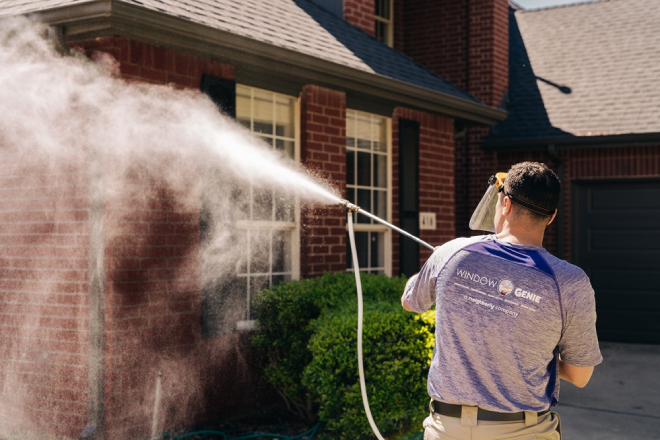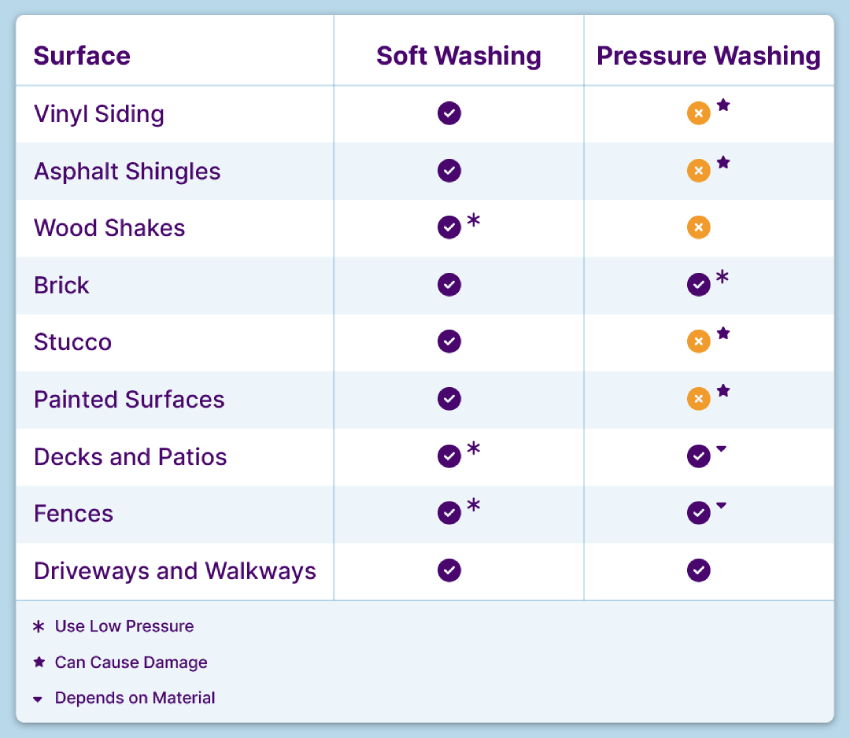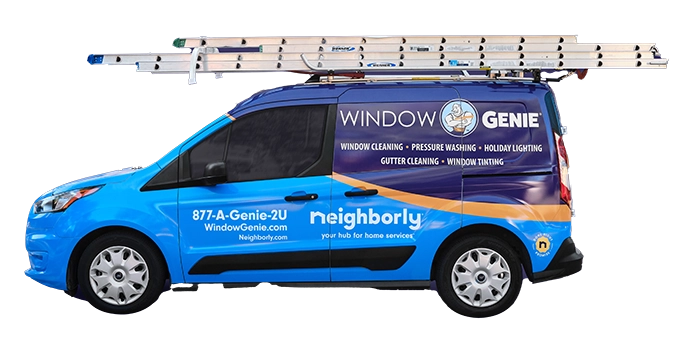
Whether you have a diligent HOA or simply want to boost your curb appeal, keep your home's exterior looking its best by washing the exterior. But with so many cleaning methods on the market, it can be tough to decide which one is right for your house. Two popular options are soft washing and pressure washing. Each comes with pros, cons, and ideal applications. Thanks to many years of soft wash pressure washing, Window Genie® can answer questions about both methods and provide you with all the facts needed to make an informed decision about the best cleaning method for the exterior of your home.
What is Soft Washing?
Soft washing is a gentle yet effective cleaning method that is perfect for delicate surfaces. It uses a low-pressure stream of water combined with a specially formulated cleaning solution to safely remove dirt, algae, and other contaminants following a proven series of steps.
- Pre-wetting the surface: The first step that helps to loosen dirt and grime and prepares the surface for receiving the cleaning solution.
- Applying the cleaning solution: A low-pressure sprayer applies a specially formulated cleaning solution to the exterior surfaces of your home, breaking slippery surfaces and dirt films.
- Letting the solution sit: The service professional gives the cleaning solution time to activate on the surface, allowing it to break down unwanted particles on your siding or deck.
- Rinsing with low pressure: A low-pressure stream of water is used to rinse away the cleaning solution and contaminants. The pressure should be low enough to avoid damaging even the most delicate surfaces.
- Post-treatment (optional): In some cases, a post-treatment rinse with clean water may be applied to remove any remaining cleaning solution residue.
Soft wash pressure washing is a great choice for a variety of exterior surfaces, including:
- Vinyl and cedar siding
- Asphalt shingles
- Wood shakes
- Brick
- Stucco
- Painted surfaces
- Decks
- Patios
- Fences
Soft Washing Pros
- Less risk of damage: Soft washing uses low pressure, which is much gentler on delicate home exterior surfaces like wood siding, shingles, and windows.
- Eco-friendly: The cleaning solutions used in soft washing are typically biodegradable, making it an eco-friendly way to refresh your home’s exterior.
- More effective for certain materials: Soft washing is more effective than pressure washing for cleaning certain materials, such as roofs and stucco. This is because the low water pressure is less likely to damage these materials, and the cleaning solution can sit on the surface for a longer period, breaking down dirt and grime more effectively.
Soft Washing Cons
Soft wash pressure washing is a fantastic option for many situations, but it's not a perfect solution for everything. Keep these points in mind when deciding if soft washing is the right choice for your home:
- Requires cleaning solutions: Unlike pressure washing, which relies solely on water pressure, soft washing uses specialized cleaning solutions.
- May need repeat washes: Depending on the severity of the grime and growth on your home, a single soft washing treatment might not be enough, requiring a second application or a more concentrated solution.
- Slower process: Soft washing takes more time than pressure washing due to the need for pre-treatment, wait time for the cleaning solution to activate, and a gentler rinsing process.
- Not ideal for all stains: While effective for organic growth like algae, soft washing may not be strong enough to remove stubborn stains like paint splatters or rust.
What is Pressure Washing?
Pressure washing is a powerful cleaning method that utilizes a highly concentrated stream of water to remove dirt, grime, and even some paint or loose materials from surfaces. Unlike soft washing, which uses a gentle approach, pressure washing packs a punch, making it ideal for tougher cleaning jobs. Its powerful water stream can penetrate deep into surfaces, removing stubborn stains that traditional cleaning methods often overlook.
Pressure washing works by using:
- Water connection: A pressure washer is connected to a water source, typically a garden hose.
- Engine power: The engine of the pressure washer pressurizes the incoming water, increasing its force significantly.
- Spray nozzle: The pressurized water is then channeled through a spray nozzle, further focusing the water stream and increasing its cleaning power.
- Surface cleaning: The service professional directs the high-pressure stream at the target surface, effectively removing dirt, grime, and other unwanted dirt.
Pressure washing is an effective way to clean and reset a variety of exterior surfaces and fixtures around your home, including:
- Driveways and walkways
- Patios and decks
- Siding (certain types only)
- Fences and retaining walls
- Exterior furniture
- Graffiti removal (on appropriate surfaces)
Safety Note: Pressure washing is a powerful tool, and not using the machine properly can damage surfaces or even cause injury when used on the wrong setting. Be sure to read the manufacturer's instructions carefully before using a pressure washer, and think of hiring a professional if you're unsure about using it yourself.
Pressure Washing Pros
- A fast and effective cleaning: Pressure washing blasts away dirt, grime, and even some paint quickly and efficiently. It's a great time-saver for tackling large or heavily soiled areas.
- Deep cleaning power: The high-pressure water stream can reach deep into cracks and crevices, removing stubborn dirt and contaminants that other cleaning methods might miss.
- Versatile uses: Pressure washers can be used on a variety of surfaces, making them a one-stop solution for cleaning patios, driveways, siding (with proper precautions), fences, and more.
Pressure Washing Cons
While pressure washing is a powerful tool, it's not without its drawbacks. Keep a few things in mind before you reach for the pressure washer.
- Risk of damage: If not used properly, the high pressure of the water stream can damage delicate surfaces like wood and vinyl siding, shingles, and even windows. Take the time to understand the appropriate pressure setting for different surfaces and use the correct nozzle attachment.
- Safety hazard: The forceful water stream can cause serious injury if not handled with care. Always wear proper eye protection and gloves when operating a pressure washer. Remember to always wear closed-toed shoes.
- Improper Use Can Worsen Problems: Using the wrong pressure or technique can worsen existing problems. For instance, high pressure on loose paint might cause it to peel more extensively.
- Environmental Impact: Pressure washing uses a significant amount of water, which can be a concern in areas with water restrictions. Additionally, some cleaning solutions used in pressure washers can be harmful to plants and wildlife if not disposed of properly.
- Not Ideal for All Surfaces: As mentioned earlier, pressure washing is not suitable for all surfaces. Especially on the strongest water pressure setting, it's best for tough, durable materials like concrete or brick.
Soft Washing vs. Pressure Washing
Keeping your home's exterior looking clean can be a constant battle against the elements. Will soft wash pressure washing get the job done or does a higher pressure washing approach make more sense? Both methods have their strengths and weaknesses and mostly depend on the specific surface and type of dirt you're facing. When it comes to cleaning grime and unwanted films like algae, finding the right cleaning solution can make all the difference.
Ideal Surfaces for Soft Washing and Pressure Washing

Should You Soft Wash or Pressure Wash Your Home?
Convinced your home's exterior needs a good cleaning, but unsure which method to call in? Don't worry, we've got you covered.
Soft Wash Pressure Washing Makes Sense If:
- The grime is organic: Battling algae, mysterious films and roof stains? Soft washing is the right choice. Its cleaning solutions dissolve these organic materials without harming delicate surfaces.
- A gentle touch is needed: Soft washing is the right solution for wood and vinyl siding, asphalt shingles, stucco, and painted surfaces. Its low-pressure approach removes contaminants without causing scratches or dents.
- Your goal is to be preventative: Regular soft washing treatments can help prevent future growth, keeping your home looking fresh for longer.
Pressure Washing Steps Up When:
- You need a heavy-duty method: Got stubborn grime, peeling paint, or built-up dirt on your driveway? Pressure washing is aggressive enough. to cut through tough messes on surfaces that can handle the force, like concrete driveways, brick patios, and sturdy fences.
- It’s time for a smooth surface: Thinking about repainting your exterior or giving your walkways a facelift? Pressure washing can be a great first step – it removes loose paint, dirt, and grime, creating a clean canvas for a fresh coat of paint or stain.
- You’re pressed for time: Pressure washing tackles large, heavily soiled areas quickly and efficiently.
Signs your Home Needs Soft Washed or Pressure Washed
Here's a checklist to help you identify if your home needs a gentle soft wash pressure washing or a powerful pressure wash:
Soft Washing Checklist:
- Do you see green, black, or brown streaks on your roof or siding? This is likely algae or another type of growth, prime targets for soft washing cleaning solutions.
- Are your gutters overflowing with dark, leafy debris? Moss and other organic matter can clog gutters, and soft washing can help prevent future buildup.
- Are your decks or patios looking a little lackluster? Soft washing can remove surface dirt, restoring their natural beauty.
- Does your vinyl siding look dull and discolored? Soft washing can gently remove dirt and grime, bringing back its vibrant appearance.
- Have you noticed cobwebs and dust clinging to your painted surfaces? Soft washing can refresh these areas without harming the paint.
- Are your wood shakes weathered and looking a bit tired? Soft washing (using low pressure) can clean them without causing damage.
Pressure Washing Checklist
- Are there unsightly oil stains all over your driveway? Pressure washing can be your best offense against these stubborn stains.
- Has rust taken hold of your metal siding or fence? Pressure washing can effectively remove it, restoring a clean look.
- Do unsightly paint splatters disrupt the harmony of your exterior paver walkway? Pressure washing can tackle these unwanted splashes.
- Is your concrete patio covered in a layer of grime and dirt? Pressure washing can blast away years of built-up grime, revealing a fresh surface.
- Do your walkways look like forgotten paths due to accumulated dirt and moss? Pressure washing can bring them back to life.
- Has graffiti turned your exterior walls into an unwanted art gallery? Pressure washing (on appropriate surfaces) can remove it effectively.
Remember: These checklists are meant to be a high-level guide. If you're unsure about the best cleaning method for your specific surface, consult a trusted service professional experienced in soft and pressure washing.
Call Window Genie® for Your Soft Wash & Pressure Washing Needs
Remember, choosing the right cleaning method for the right surface is key to achieving a sparkling clean exterior without causing any damage.
Not sure which method is best for your home? Window Genie is here to help. Our trained service professionals can assess your specific needs and recommend the safest and most effective house washing method for your home's exterior.
Need heavy duty results for your business? Explore how our commercial pressure washing services, backed by our Neighborly Done Right Promise™, ensures you’ll be happy with our work.
Ready to experience the Window Genie difference? Request a quote from our house washing team today!
This article is intended for general guidance only and is not applicable to every situation. You are responsible for determining the proper course of action for your property and situation. Window Genie is not responsible for any damages that occur as a result of advice and/or guidance derived from its blog content.
Soft Wash vs. Pressure Washing FAQ
Window Genie professionals have been transforming homes and businesses with sparkling clean exteriors for years. All those years of tackling different kinds of dirt, grime, and stains have given us extensive knowledge about how to choose the right cleaning method for the job. To help you make an informed choice about choosing the right cleaning method for your home, our experts have answered some of the most frequently asked questions.
Is Soft Washing Safe for My Roof?
Yes. Soft washing is specifically designed to clean delicate surfaces like roofs without causing damage. Here's why:
- Gentle Touch: Soft washing utilizes a low-pressure water stream that won't dislodge shingles or damage the roof's integrity.
- Targeted Cleaning Power: The cleaning solutions used in soft washing break down and remove algae, moss, and other organic growth that can deteriorate your roof over time.
- Extends Roof Life: By removing harmful organisms and dirt buildup, soft washing can actually help extend the lifespan of your roof.
- Careful when cleaning solar panels! They require a different cleaning technique.
Can Pressure Washing Damage My Surfaces?
Yes, pressure washing can damage surfaces if not used correctly. Always use the appropriate pressure setting for the specific surface you're cleaning. Also, improper spray wand handling can cause uneven cleaning or even gouge softer materials. Pressure washing is not suitable for all surfaces. Avoid using it on vinyl siding, asphalt shingles, or painted surfaces, as it can cause significant damage.
What Are the Costs Associated with Soft and Pressure Washing?
The cost of both soft washing and pressure washing by a professional can vary depending on several factors:
- Size of the area: The square footage of the area being cleaned significantly impacts the price.
- Severity of the cleaning job: Heavier cleaning needs requiring stronger solutions or multiple treatments will take more time and likely cost more.
Soft Washing Costs:
- Typically ranges between $0.20 and $1.00 per square foot.
- May be slightly more expensive than pressure washing due to the specialized cleaning solutions used.
Pressure Washing Costs:
- Typically ranges between $0.10 and $0.75 per square foot.
Remember: When considering costs, factor in the potential for damage if you attempt pressure washing yourself. Hiring a professional for delicate surfaces or complex jobs might be more cost-effective in the long run.
